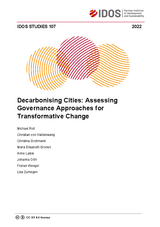Studies
Decarbonising cities: assessing governance approaches for transformative change
Roll, Michael / Christian von Haldenwang / Christina Grohmann / Maria Elisabeth Gronen / Anne Laible / Johanna Orth / Florian Wengel / Lisa ZumegenStudies (107)
Bonn: German Institute of Development and Sustainability (IDOS)
DOI: https://doi.org/10.23661/is107.2022
Price: 10 €
While cities are important emitters of greenhouse gases (GHG), they are also vulnerable to the impacts of climate change; at the same time they constitute innovation hubs for climate action. For cities to fulfil their potential for global climate action, a thorough understanding of the governance of transformative change towards the decarbonisation of cities is necessary.
This study asks: Which governance approaches facilitate successful transformative change towards zero carbon in cities? It specifically addresses the three key aspects stakeholder involvement, financing, and impact assessment, and looks at how they contribute to transformative change – particularly to the dimensions CO2 reduction, the dynamics of transformation, and acceptance by citizens.
The empirical analysis is based on a mixed methods approach. An international survey involving city government officials of cities that are proactive in the fight against climate change was conducted in order to obtain an overview of socio-ecological transformation paths. In addition to this macro-level approach, in-depth case studies of three cities that are widely regarded as proactive on climate action in their respective world regions – Bonn, Quito and Cape Town – provide complementary insights.
The survey data show a generally positive tendency in the way local governments approach GHG emission reduction activities. Most of the participating cities engage in the mainstreaming of policies to address climate change in local decision-making and have established climate action plans and emission reduction targets; however, on actual climate action and the reduction of emissions, the picture is more mixed.
While stakeholder involvement is generally considered a key success factor in the survey responses and in the three case-study cities, stakeholders were seldom involved in a truly inclusive and cooperative way. While Bonn has gradually expanded citizen engagement, in Quito relations between the local government and stakeholder groups have often been short-term and project-bound, while a close connection between city government and academic institutions has been established in Cape Town.
In terms of finance, cities mostly rely on traditional financing sources such as intergovernmental transfers, local taxes and fees, as well as international grants to cities of the Global South. Additional funding through the generation of local revenues or market-based finance mechanisms is less widespread. Both Quito and Cape Town depend heavily on external funding from international organisations and donors, along with central government transfers, which are less relevant in Bonn. While building the metro is absorbing finances for additional climate action in Quito, perverse incentives exist in South Africa where cities receive revenues from re-selling fossil fuel-based energy to consumers. Bonn has recently started to experiment with a sustainability budget to align budgeting with sustainability and climate goals.
As far as impact assessment is concerned, most cities in the survey including the three case-study cities collect relevant data. However, systematic impact assessment or the incorporation of lessons learned from monitoring and evaluation into policy occur less frequently.
Despite its limitations, this study contributes to the theoretical and empirical discussions in the field of transformative urban governance by suggesting a conceptual framework for dimensions of success for transformative change, by combining survey and case study-based data, and by looking at finances and impact assessment which are two important governance dimensions that are not frequently investigated.
Contact
Cornelia Hornschild
Publication Coordinator
E-mail Cornelia.Hornschild@idos-research.de
Phone +49 (0)228 94927-135
Fax +49 (0)228 94927-130
Alexandra Fante
Librarian/ Open Access Coordinator
E-Mail Alexandra.Fante@idos-research.de
Telefon +49 (0)228 94927-321
Fax +49 (0)228 94927-130







![[Translate to English:] Photo: Alexandra Fante, Bibliothekarin/Open Access-Koordinatorin](/fileadmin/_processed_/f/0/csm__c_Deutsches-Institut-fuer-Entwicklungspolitik_Fante_94ce4fa1ba.jpg)